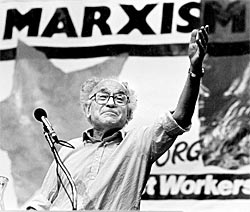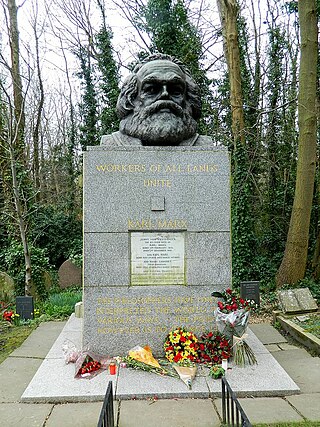James "Jock" Ritchie Haston (1913–1986) was a Trotskyist politician and General Secretary of the Revolutionary Communist Party in Great Britain.
Bill Hunter was a Trotskyist activist in Britain and a leader of the International Socialist League.
John Gordon Michael Lawrence was a leading far-left activist in a wide variety of groups in Britain.
The history of the Socialist Workers Party begins with the formation of the Socialist Review Group in 1950, followed by the creation of the International Socialists in 1962 and continues through to the present day with the formation of the Socialist Workers Party in 1977.
Jimmy Deane was a British Trotskyist who played a significant role in building the Revolutionary Socialist League. Along with Jock Haston and Ted Grant, he played a role during the Second World War in the Revolutionary Communist Party, the British section of the Fourth International.
The Marxist Group was an early Trotskyist group in the United Kingdom.
Betty Hamilton (1904–1994) was a British Trotskyist.
The Left Fraction, sometimes calling itself the Left Fraction, British Section of the Fourth International , was a Trotskyist organisation in the United Kingdom.
The Labour Party Young Socialists (LPYS) was the youth section of the Labour Party in Britain from 1965 until 1991. In the 1980s, it had around 600 branches, 2,000 delegates at its national conferences and published a monthly newspaper, Left, later Socialist Youth. From the early 1970s, it was led by members of Militant.

Thomas Gerard Healy was an Irish-born British political activist, a co-founder of the International Committee of the Fourth International and the leader of the Socialist Labour League and later the Workers Revolutionary Party.
The International Marxist Group (IMG) was a Trotskyist group in Britain between 1968 and 1982. It was the British Section of the Fourth International. It had around 1,000 members and supporters in the late 1970s. In 1980, it had 682 members; by 1982, when it changed its name to the Socialist League, membership had fallen to 534.
The Militant Group was an early British Trotskyist group, formed in 1935 by Denzil Dean Harber, former leader of the entrist Marxist Group in the ILP, as a separate entrist group inside the Labour Party.
Denzil Dean Harber was an early British Trotskyist leader and later in his life a prominent British ornithologist.
The Workers' International League (WIL) was a Trotskyist group that existed in Britain from 1937 to 1944.
The Workers Revolutionary Party (WRP) is a Trotskyist group in Britain once led by Gerry Healy. In the mid-1980s, it split into several smaller groups, one of which retains possession of the name.

Tony Cliff was a Trotskyist activist. Born to a Jewish family in Ottoman Palestine, he moved to Britain in 1947 and by the end of the 1950s had assumed the pen name of Tony Cliff. A founding member of the Socialist Review Group, which became the International Socialists and then the Socialist Workers Party, in 1977. Cliff was effectively the leader of all three.
The first Revolutionary Socialist League (RSL) was formed in early 1938 by the merger of the Marxist League led by Harry Wicks and the Marxist Group led by C. L. R. James.

Edward Grant was a South African Trotskyist who spent most of his adult life in Britain. He was a founding member of the group Militant and later Socialist Appeal.
Orthodox Trotskyism is a branch of Trotskyism which aims to adhere more closely to the philosophy, methods and positions of Leon Trotsky and the early Fourth International, Vladimir Lenin and Karl Marx than other avowed Trotskyists.

Far-left politics in the United Kingdom have existed since at least the 1840s, with the formation of various organisations following ideologies such as Marxism, revolutionary socialism, communism, anarchism and syndicalism.




